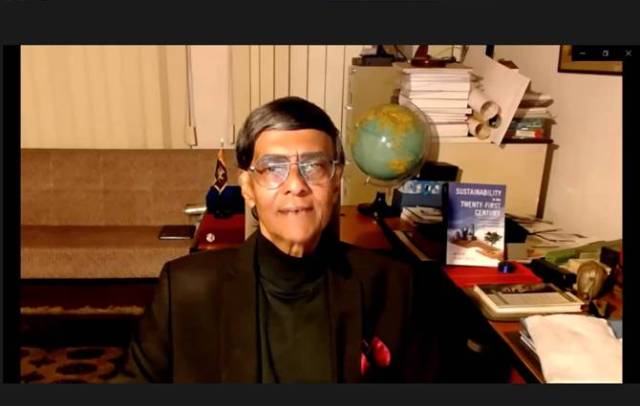 Prof. Munasinghe described the Commonwealth as “a diverse community of nations”. “Let us act now … together.”
Prof. Munasinghe described the Commonwealth as “a diverse community of nations”. “Let us act now … together.”
“I don’t want to sound negative but I don’t want to sound naive either”.
This comment by Sri Lankan physicist, Mohan Munasinghe, on the prospects for the upcoming 26th Conference of the Parties (COP26), was made during a webinar on 18 October, entitled Prospects for Sustainable Development in a Post-COVID Commonwealth, jointly organised by the Royal Commonwealth Societies of Canada and Sri Lanka.
Professor Munasinghe ‘s presentation outlined global declarations from the 1947 United Nations (UN) Universal Declaration of Human Rights, the 1992 Rio Earth Summit agenda, the Development goals in 2000 and the 2015 UN Agenda 2030 Paris Accord. He referred to them as “75 years of unmet goals and broken promises”.
Prof. Munasinghe is the Founder Chairman of the Munasinghe Institute of Development (MIND) in Colombo, the Vice Chair of the UN Intergovernmental Panel on Climate Change, which shared the 2007 Nobel Prize for Peace, and the 2021 Blue Planet Prize Laureate (also known as the ‘Environmental Nobel Prize’).
In the RCS Q&A session, he was asked about world leaders delivering on their COP26 commitments. Stating that he didn’t want to sound negative or naive, Prof. Munasinghe said that organisations such as the RCS and civil society groups needed to “push the politicians”. He added that these summits are “photo opportunities” but that the right lobbying could aim at new models of living in a post-pandemic world.
He described the Commonwealth as “a diverse community of nations”. “Let us act now … together,” he said.
Numerous challenges
The frustrations voiced by the Blue Planet Prize Laureate have been echoed recently by a wide range of people, including the Commonwealth’s finest minds, the head of the Commonwealth herself, regional and small island-aligned groupings and Commonwealth societies.
From 31 October to 12 November, world leaders, scientists, civil society groups and environmental groups will attend the series of meetings in Glasgow under the COP26 banner.
The key challenges include agreeing on how global carbon markets should work, reviewing how to support sustainable development in poorer countries, working out ways to deliver fully on a promised climate finance fund and helping developing countries get started on their so-called green transition.
The latest part of a report by the Intergovernmental Panel on Climate Change (IPCC), the body of the world’s leading climate scientists, described climate change as “widespread, rapid, and intensifying”. The IPCC said that temperatures are likely to rise by more than 1.5C above pre-industrial levels in breach of the 2015 Paris climate agreement, bringing widespread devastation and extreme weather.
Front line concerns
Ahead of the legally-binding 2015 Paris Accord on climate change, Commonwealth countries had used their Malta Heads of Government Meeting (CHOGM) as a launch pad for their unified climate change message. Without a CHOGM in 2020 or 2021, the message from across the Commonwealth has been less centralised. For those at the frontline of the climate crisis, there have been a series of meetings and statements issued by regional groupings.
Pacific ACP states urged wealthy nations not to use the Covid-19 pandemic as “an excuse … to delay ambitious climate action”. The Pacific Islands Forum Chair, Fiji’s Prime Minister Josaia V. (Frank) Bainimarama said in early October that “Pacific nations are making it clear that the Glasgow climate negotiations must address the lost momentum of two years”. However, the week before COP26, Pacific leaders admitted that they were facing difficulties attending the summit to get the momentum going.
At a Caribbean Community (CARICOM) meeting two weeks ahead of COP26, Caribbean countries talked of a “countdown to zero”. Professor Michael Taylor of the University of the West Indies (UWI), quoted the IPCC report adding that “heading to 2°C is too much for SIDS [small island developing states]. Even at 1.5°C, we are only guaranteed half a chance of a liveable future.”
Ambassador Aubrey Webson, of Antigua and Barbuda who is the current chairperson of the Alliance of Small Island States (AOSIS), told the meeting that “we cannot do business as usual; we must move to net zero”.
African nations focused on the delivery of the previously promised climate change funding. The chair of the African Group of Negotiators at COP26, Tanguy Gahouma-Bekale, said on 14 October that wealthy nations had not met their $100 billion annual target to help developing countries tackle climate change. African countries stated that they wanted to see a new tracker system to follow the funding and how it is being disbursed. “We need to have a clear roadmap how they will put on the table the $100 billion per year, how we can track (it),” he told Reuters.
The need to harmonise
As Prof. Munasinghe repeated his sustainomics message at the October RCS event, he outlined the need for countries to manage post-Covid urban growth and work on “the right values” and build societies on the basis of “sustainable consumption”. He urged emerging nations to bring the poor out of poverty along a “green path”.
Prof. Munasinghe repeated the model for green growth from his book Sustainability in the 21st Century. He urged countries not to follow the “profligate curve” of rich countries and to look at how to “grow green and inclusively”. He said that digital technology would play a key role.
“We need to harmonise ourselves before we harmonise the earth,” he told the RCS audiences in Sri Lanka and Canada.
Related articles:
John Kerry says Glasgow COP26 is the last best hope for the world – BBC
Small states must rage at COP26 – it’s the last chance saloon – Sir Ronald Sanders
Trade ministers must pull their weight on climate action – Chatham House
UNDP small island states bulletin
Africa calls for climate finance tracker after donors fall short – Reuters



